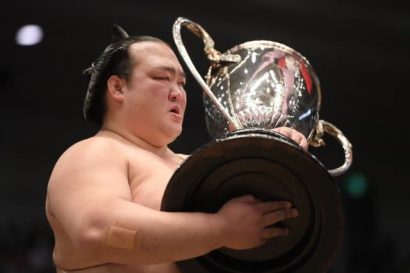
Kisenosato remporte son deuxième titre
Dans une finale spectaculaire, le yokozuna Kisenosato est parvenu à obtenir le second titre de sa carrière en battant deux fois de suite l’ôzeki Terunofuji.
Après avoir été blessé à l’épaule vendredi, Kisenosato avait été inefficace le lendemain permettant à Terunofuji de prendre la tête du tournoi. Ayant besoin d’une victoire pour égaliser son score à 13-2 et accéder au playoff, Kisenosato a accompli l’exploit de s’imposer dans l’avant dernier combat du jour.
Le nouveau yokozuna a essayé d’esquiver la charge de l’ôzeki mais a échoué. Visiblement plus fort du bras gauche que la veille, Kisenosato a pu revenir au score en poussant son adversaire à terre.
Après que Kakuryu ait envoyé son compatriote mongol Harumafuji hors du dohyô dans le combat final laissant les deux hommes au score de 10-5, Terunofuji et le favori Kisenosato, sont montés sur le dohyô pour se départager.
Kisenosato, qui est devenu le premier japonais à être promu yokozuna depuis 1998, s’est agrippé au mawashi de Terunofuji et l’a renversé sur le bord de l’anneau.
Premier nouveau yokozuna à remporter un tournoi en 22 ans
« Je suis sans voix« , a dit Kisenosato. « Il y avait quelque chose en plus de ma force qui m’ont poussé à me surpasser. Mes seules pensées étaient que je devais me concentrer pour gagner« .
Très encouragé par le public depuis le premier jour, Kisenosato n’a pas pu cacher ses émotions après sa victoire.
« J’étais au bord des larmes« , a déclaré Tomozuna oyakata, le sous-directeur du département des juges de l’Association Japonaise de Sumo. « Le 14ème jour, c’était douloureux, c’était énorme car il ne s’est pas démotivé (après sa première défaite). Il a persévéré malgré sa blessure qui l’ont contraint à adopter une mauvaise posture dans ces deux combats d’aujourd’hui, mais son corps ne s’est jamais arrêté.«
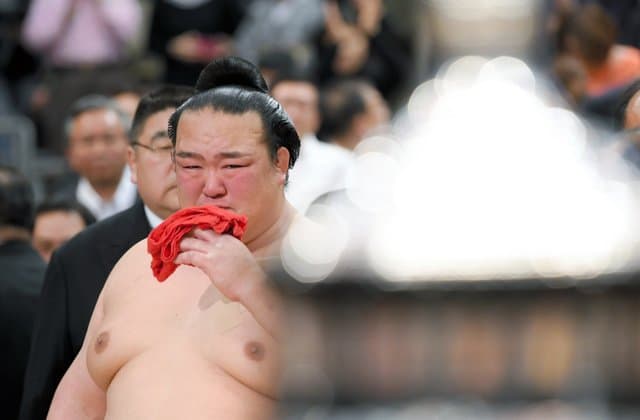
Takanohana a été le dernier à remporter un championnat alors qu’il venait d’être promu yokozuna. La victoire de Kisenosato a mis un frein au tournoi de Terunofuji qui semblait en bonnes conditions physiques pour la première fois depuis deux ans.
A 25 ans, Terunofuji – de son vrai nom Gantulga Ganerdene – a été promu ôzeki en 2015 après avoir remporté son premier makuuchi yûshô la même année. L’année 2016 avait été catastrophique pour lui en raison du mauvais état de ses genoux l’obligeant à subir une opération arthroscopique.
Terunofuji a débuté ce tournoi en situation de kadoban suite à son mauvais résultat précédent (4-11 en janvier). L’ôzeki était contraint de remporter au moins huit victoires pour conserver son grade actuel. Au lieu de capituler, le géant mongol s’est battu sans relâche avant d’être vaincu par Takayasu le sixième jour.
Pour ses excellents résultats (12-3), le sekiwake Takayasu a été récompensé pour la troisième de sa carrière d’un shukun shô. Takayasu a obtenu sa douzième victoire en battant son homologue sekiwake Tamawashi (8-7).
A seulement 20 ans, le maegashira 13 Takakeisho (11-4) a obtenu sa première récompense avec le prix qui l’esprit combatif. Pour son deuxième tournoi en division makuuchi, Takakeisho s’est imposé face à Chiyoshoma (9-6).
« Je n’imaginais pas cela« , a déclaré Takakeisho qui devait vaincre son adversaire du jour pour gagner son prix spécial. « Juste avant le combat on m’a informé du prix mais je voulais gagner avant toute chose« .
« Le premier jour, j’ai mal lutté et j’ai perdu. J’ai dû me remettre en question car j’avais le désir de gagner. C’était un tournant.«
Après avoir échoué à récupérer son rang d’ôzeki avec 10 victoires, le sekiwake Kotoshogiku (9-6) est sorti vainqueur de son impressionnant face à face musclé avec Yoshikaze (8-7)
Les lutteurs kachi koshi du jour sont
:
Jûryô : Daiamami et Seiro
Les lutteurs make koshi du jour sont :
Jûryô : Satoyama et Asahisho
Clic on the title bellow for article in English :
Yokozuna Kisenosato denies Terunofuji to win Spring title
Taped-up yokozuna Kisenosato came from behind to win the Spring Grand Sumo tournament in dramatic fashion, defeating in-form ozeki Terunofuji twice on Sunday and becoming the first newly promoted yokozuna to win a championship in 22 years.
After suffering a fall on his left shoulder on Friday, Kisenosato was ineffective the following day, when his second straight loss allowed Terunofuji to take the lead. Needing a win on Sunday to even their records at 13-2 and force a championship playoff, Kisenosato somehow survived while his opponent slipped to the surface.
After Kakuryu dispatched fellow Mongolian yokozuna Harumafuji to end the tournament’s regularly scheduled bouts and leave both men with 10-5 records, Terunofuji and crowd favorite Kisenosato returned to the ring.
The first Japanese to be promoted to yokozuna since 1998 with his championship in January, Kisenosato surrendered a solid belt hold to his opponent. But Terunofuji clung to his grip and it proved his undoing as the yokozuna tipped him over to earn the victory.
« I’m speechless, » Kisenosato said. « There was something at work that was more than my own strength. My only thoughts were on concentrating and executing. »
The crowd, firmly behind him from Day 1, erupted when Kisenosato locked onto Terunofuji’s arm and threw him for the final victory, and the emotion was not limited to the spectators.
« I was on the verge of tears, » said sumo elder Tomozuna, the sub director of the Japan Sumo Association judges department. « To come out on the 14th day in pain, that was huge because he never let up (by forfeiting that match and resting). His posture in both bouts (on Sunday) was bad, but his body never stopped. »
Takanohana was the last to win a championship in his first tournament as yokozuna, while Kisenosato’s win put a damper on a fine tournament from Terunofuji who appeared healthy for the first time in nearly two years.
The 25-year-old Mongolian, whose real name is Gantulga Ganerdene, had struggled since a four-tournament stretch in 2015 — during which he was promoted to ozeki — when he went a combined 48-12. He won his first grand tournament and was runner-up in another then, falling in a championship playoff to yokozuna Kakuryu in September.
Terunofuji posted a 9-6 mark in the following tournament, but had failed to match that win total for seven straight tournaments in which the lack of strength and flexibility in his legs made him vulnerable. He sat out the final six days of the 2016 New Year grand tournament and underwent arthroscopic surgery on his left knee soon after.
Terunofuji entered this tournament with his ozeki ranking in jeopardy after going 4-11 in January. But instead of capitulating, Terunofuji conquered. He bludgeoned his way past his first five opponents before falling to in-form sekiwake Takayasu on the sixth day.
For earning 10-plus wins and being the only wrestler to stop Terunofuji through the first 14 days, Takayasu earned the third Outstanding Performance Prize of his career. Takayasu, who went 11-4 in January, improved to 12-3, forcing out fellow sekiwake Tamawashi (8-7).
Takakeisho, a 20-year-old No. 13 maegashira fighting in his second tournament in the elite makuuchi division, secured his first career tournament prize, the Fighting Spirit award, by concluding the 15-day event with a win over No. 7 maegashira Chiyoshoma (9-6) and earning his 11th win.
« I didn’t imagine this, » said Takakeisho, whose prize was conditional on his beating Chiyoshoma. « Today was a good match. Just before my bout I heard about the prize. But first of all, I had to win. »
« The first day, I wrestled poorly and lost, and I had to question my desire to win. That was a turning point. »
Having failed to reclaim his ozeki ranking with 10 wins, sekiwake Kotoshogiku (9-6) went out a winner in an impressive drive and forceout of No. 4 maegashira Yoshikaze (8-7).
Written by Kyodo

Champions par division :
Makuuchi : Kisenosato (13-2)
Yokozuna – Tagonoura beya
Jûryô : Toyohibiki (10-5)
Ouest 3 – Sakaigawa beya
Makushita : Abi (7-0)
Est 16 – Shikoroyama beya
Sandanme : Tamakongo (7-0)
Ouest 35 – Katanonami beya
Jonidan : Wakayama (7-0)
Est 32 – Onomatsu beya
Jonokuchi : Ichiyamamoto (7-0)
Est 15 – Nishonoseki beya
Prix spéciaux (sanshô) :
Shukun-shô : Takayasu (3ème)
Performance exceptionnelle
Kantô-shô : Takakeiso (1er)
Meilleur esprit combatif
Ginô-shô : non attribué
Prix de la technique
Kinboshi pour :
- Sokokurai (1er) contre Harumafuji (J3)
- Ikioi (3ème) contre Hakuho (J4)
- Shohozan (4ème) contre Kakuryu (J6)
- Arawashi (3ème) contre Harumafuji (J9)
- Yoshikaze (6ème) contre Kakuryu (J10)
- Parution du banzuke : 1er mai
- Début du tournoi : 14 mai
- Fin du tournoi : 28 mai
Lieu : Tokyo (Ryogoku Kokugikan)
Merci à tous d’avoir suivi le tournoi jour après jour sur Dosukoi mais l’actualité du sumo continue même en dehors des basho. Toutes les informations des événements à venir sont sur notre site. N’oubliez pas de nous rejoindre sur les réseaux sociaux, suivez-nous sur Facebook, Google + et Twitter et abonnez-vous à notre chaîne YouTube. N’hésitez pas à partager les articles sur ces réseaux et à les commenter.
Enfin, merci à Kintamayama ainsi qu’à Robert Mensing pour leurs vidéos quotidiennes ainsi qu’à tous nos lecteurs.
- Makuuchi
- Juryô
|
Rikishis
|
Kimarites
|
Rikishis
|
|
Daieisho
大栄翔 (Maegashira 11) 11-4 |
 |
|
tsukidashi
突き出し |
|
 |
Kotoyuki
琴勇輝 (Maegashira 9) 5-10 |
|
Kagayaki
輝 (Maegashira 9) 7-8 |
 |
|
oshidashi
押し出し |
|
 |
Nishikigi
錦木 (Maegashira 16) 5-10 |
|
Sadanoumi |
 |
|
kotenage
小手投げ |
|
 |
Okinoumi
隠岐の海 (Maegashira 8) 10-5 |
|
Takakeisho
貴景勝 (Maegashira 13) 11-4 |
 |
|
oshidashi
押し出し |
|
 |
Chiyoshoma
千代翔馬 (Maegashira 7) 9-6 |
|
Ichinojo
逸ノ城 (Maegashira 7) 6-9 |
 |
|
sukuinage
掬い投げ |
|
 |
Ura
宇良 (Maegashira 12) 8-7 |
|
Myogiryu
妙義龍 (Maegashira 14) 6-9 |
 |
|
hatakikomi
叩き込み |
|
 |
Aoiyama
碧山 (Maegashira 6) 8-7 |
|
Chiyonokuni
千代の国 (Maegashira 6) 9-6 |
 |
|
tsukiotoshi
突き落とし |
|
 |
Tokushôryû
徳勝龍 (Maegashira 15) 8-7 |
|
Daishomaru
大翔丸 (Maegashira 13) 7-8 |
 |
|
tsukiotoshi
突き落とし |
|
 |
Hokutofuji
北勝富士 (Maegashira 5) 7-8 |
|
Endo
遠藤 (Maegashira 5) 8-7 |
 |
|
yorikiri
寄り切り |
|
 |
Tochinoshin
栃ノ心 (Maegashira 10) 7-8 |
|
Ishiura |
 |
|
oshidashi
押し出し |
|
 |
Takarafuji
宝富士 (Maegashira 3) 7-8 |
|
Sokokurai
蒼国来 (Maegashira 2) 4-11 |
 |
|
yorikiri
寄り切り |
|
 |
Kyokushuho
旭秀鵬 (Maegashira 14) 5-10 |
|
Kaisei
魁聖 (Maegashira 8) 3-7-5 |
 |
|
tsukiotoshi
突き落とし |
|
 |
Ikioi |
|
Takekaze
豪風 (Maegashira 1) 5-10 |
 |
|
oshidashi
押し出し |
|
 |
Shôhôzan |
|
Takanoiwa
貴ノ岩 (Maegashira 2) 6-9 |
 |
|
yorikiri
寄り切り |
|
 |
Shodai
正代 (Komusubi) 4-11 |
|
Mitakeumi
御嶽海 (Komusubi) 9-6 |
 |
|
hikiotoshi
引き落とし |
|
 |
Tochiôzan
栃煌山 (Maegashira 10) 10-5 |
|
Kotoshôgiku
琴奨菊 (Sekiwake) 9-6 |
 |
|
yorikiri
寄り切り |
|
 |
Yoshikaze
嘉風 (Maegashira 4) 8-7 |
|
Tamawashi
玉鷲 (Sekiwake) 8-7 |
 |
|
yorikiri
寄り切り |
|
 |
Takayasu
高安 (Sekiwake) 12-3 |
|
Terunofuji |
 |
|
tsukiotoshi
突き落とし |
|
 |
Kisenosato
稀勢の里 (Yokozuna) 13-2 |
|
Harumafuji
日馬富士 (Yokozuna) 10-5 |
 |
|
yorikiri
寄り切り |
|
 |
Kakuryû
鶴竜 (Yokozuna) 10-5 |
MAKUUCHI KETTEI-SEN
|
Kisenosato
稀勢の里 (Yokozuna) 13-2 |
 |
|
kotenage
小手投げ |
|
 |
Terunofuji
照ノ富士 (ôzeki) 13-2 |
|
DOSUKOI.FR -Le site français du sumo
|
|
Rikishis
|
Kimarite
|
Rikishis
|
|
Asahishô |
 |
|
hikiotoshi
引き落とし |
|
 |
Iwasaki (Makushita 3) |
|
Seiro
青狼 (Juryô 10) 8-7 |
 |
|
yorikiri
寄り切り |
|
 |
Ryuden
竜電 (Juryô 8) 6-9 |
|
Kitataiki |
 |
|
tsukiotoshi
突き落とし |
|
 |
Amakaze
天風 (Juryô 7) 6-9 |
|
Osunaarashi
大砂嵐 (Juryô 7) 10-5 |
 |
|
yoritaoshi
寄り倒し |
|
 |
Satoyama
里山 (Juryô 10) 7-8 |
|
Yamaguchi
山口 (Juryô 6) 8-7 |
 |
|
hatakikomi
叩き込み |
|
 |
Daiamami
大奄美 (Juryô 9) 8-7 |
|
Fujiazuma |
 |
|
tsukidashi
突き出し |
|
 |
Homarefuji
誉富士 (Juryô 5) 4-11 |
|
Kotoeko
琴恵光 (Juryô 5) 5-10 |
 |
|
oshidashi
押し出し |
|
 |
Kitaharima
北磻磨 (Juryô 11) 4-11 |
|
Aminishiki
安美錦 (Juryô 12) 9-6 |
 |
|
tsukiotoshi
突き落とし |
|
 |
Oyanagi
小柳 (Juryô 4) 9-6 |
|
Chiyomaru
千代丸 (Juryô 4) 8-7 |
 |
|
oshidashi
押し出し |
|
 |
Kyokutaisei
旭大星 (Juryô 6) 9-6 |
|
Rikishin
力真 (Juryô 13) 9-6 |
 |
|
oshidashi
押し出し |
|
 |
Toyohibiki
豊響 (Juryô 3) 10-5 |
|
Hidenoumi
英乃海 (Juryô 3) 6-9 |
 |
|
okuridashi
送り出し |
|
 |
Terutsuyoshi
照強 (Juryô 14) 9-6 |
|
Asanoyama
朝乃山 (Juryô 12) 10-5 |
 |
|
uwate dashinage
上手出し投げ |
|
 |
Onosho |
|
Gagamaru
臥牙丸 (Juryô 2) 7-8 |
 |
|
yorikiri
寄り切り |
|
 |
Tsurugisho
剣翔 (Juryô 8) 8-7 |
|
Azumaryu
東龍 (Juryô 9) 9-6 |
 |
|
uwatenage
上手投げ |
|
 |
Chiyotairyû
千代大龍 (Juryô 1) 8-7 |
JURYÔ KETTEI-SEN
|
Asanoyama
朝乃山 (Juryô 12) 10-5 |
 |
|
|
 |
Toyohibiki
豊響 (Juryô 3) 10-5 |
|
|
Osunaarashi
大砂嵐 (Juryô 7) 10-5 |
 |
|
oshidashi
押し出し |
|
 |
Toyohibiki
豊響 (Juryô 3) 10-5 |
 Dosukoi, le site du sumo Sumo : actualités, résultats, dossiers, vidéos… toute la passion du sumo est sur Dosukoi!
Dosukoi, le site du sumo Sumo : actualités, résultats, dossiers, vidéos… toute la passion du sumo est sur Dosukoi!
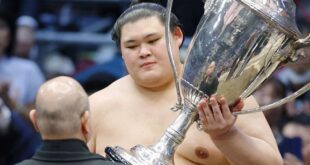
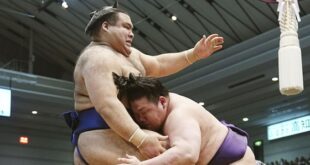
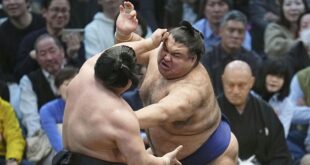



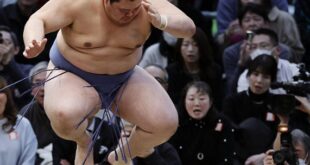
Bonjour,
Takayasu peut-il prétendre à nouveau au titre d’Ozeki?
merci